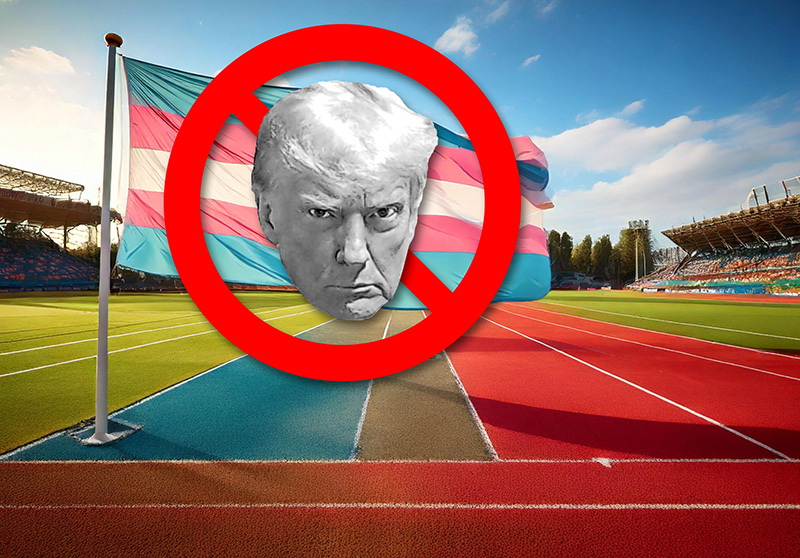Texas Senate passes bills barring trans athletes from sports teams matching their gender identity
Fate of legislation remains uncertain due to Democratic House walkout, meaning the whole process may have to be repeated.

The Texas Senate has passed two bills to restrict transgender students from participating on sports teams that match their gender identity, even as the fate of a special legislative session remains uncertain following a walkout by House Democrats in protest of a bill placing additional restrictions on voting.
The bills, SB 2 and SB 32, both authored by Sen. Charles Perry (R-Lubbock), allow student-athletes in K-12 schools and in public colleges and universities to participate only on sports teams that correspond with the sex listed on their birth certificate at or near the time of birth.
Republican leaders in the state, including Gov. Greg Abbott and Lt. Gov. Dan Patrick, who presides over the Senate, have prioritized 11 agenda items for the special 30-day legislative session.
Those agenda items include several conservative “messaging” bills, such as measures to block social media platforms from “censoring” conservative viewpoints — even if conservative users are engaging in threatening or abusive behavior; to ban people from receiving abortion-inducing drugs via mail; to censor public school teachers’ free speech by restricting what they can say or teach about race, racism, or America’s racial history; and the transgender athlete ban.
On Wednesday, both anti-transgender sports bills passed the upper chamber by votes of 19-3, with three Senate Democrats voting no, and other Senate Democrats not attending the session due to the walkout, which saw 51 House Democrats flee to Washington, D.C., in order to prevent the House from having enough members to form a quorum, thus preventing the Republican majority from jamming through the controversial bills on party-line votes.
House Democrats’ main objection was to a so-called “election integrity” bill that, among other provisions, places additional restrictions on mail-in voting and allows partisan “election observers” to disrupt the counting of votes by local elections officials if they don’t like a result.
But because there are not enough House members to form a quorum, if House Democrats stay away from Texas for more than 30 days, the bills passed by the Senate, including the transgender athlete ban, cannot pass, as both chambers must sign off on legislation.
Sen. Eddie Lucio (D-Brownsville), a socially conservative Democrat, voted with the Republican Senate majority in favor of the transgender ban.
Under the bills approved by the Senate, the UIL’s current policy, which recognizes the gender identity of transgender students who have had the sex on their birth certificate changed, would be rescinded, reports The Texas Tribune.
Additionally, the bills empower students who believe they have missed out on athletic opportunities due to the inclusion of transgender students to sue local school districts, colleges, or universities for violating the law.
Supporters of the bills claim that the measures are needed to protect the “integrity” of women’s sports and the “safety” of cisgender female athletes, who they claim will be irreparably harmed, both emotionally and physically, if forced to compete against transgender individuals — even in cases where the transgender competitor loses.
Related: Texas governor wants to ban transgender athletes from sports during special legislative session
During debate, the three dissenting Democrats who were present attacked the bill, asking questions of Perry in an effort to expose the flawed rationale behind the bill. Sen. Juan Hinojosa (D-McAllen) asked whether the bill might conflict with NCAA recommendations and lead to the NCAA canceling sporting events scheduled to be held in Texas. Perry claimed it would not.
Earlier this year, in April, the board of governors of the NCAA warned cities and states that wish to host collegiate sporting events or tournaments that it will take into account the existence of local laws that discriminate against LGBTQ people, saying that it “firmly and unequivocally supports the opportunity for transgender student-athletes to compete in college sports.”
Under the organization’s current policy, which aligns with the policies of the International Olympic Committee, and the U.S. Olympic and Paralympic Committee, transgender females must undergo a year of testosterone-suppression treatment in order to compete in sports designated for women.
“Inclusion and fairness can coexist for all student-athletes, including transgender athletes, at all levels of sport,” the statement said. “Our clear expectation as the Association’s top governing body is that all student-athletes will be treated with dignity and respect…. When determining where championships are held, NCAA policy directs that only locations where hosts can commit to providing an environment that is safe, healthy and free of discrimination should be selected. We will continue to closely monitor these situations to determine whether NCAA championships can be conducted in ways that are welcoming and respectful of all participants.”

Sen. John Whitmire (D-Houston) argued that the bills would hurt transgender children and negatively impact their mental health by making them feel excluded, potentially leading to depression, anxiety, and suicidal ideation.
“It’s documented that the team sports and activities for youngsters that are transgender … helps them deal with their [gender] identity, it helps them with their family, their siblings, their classmates,” Whitmire said. “And when you deny that, there is a strong propensity to commit suicide.”
According to a national survey of 35,000 LGBTQ people conducted by The Trevor Project earlier this year, 94% of respondents said recent political fights over LGBTQ rights “negatively affected” their mental well-being. That same survey found that 42% of all LGBTQ youth, and more than half of trans and nonbinary youth, considered attempting suicide in the past year.
Earlier in the week, on Monday, the Senate Health and Human Services Committee held an eight-hour-long committee meeting on the bills, hearing testimony from both supporters and opponents of the legislation. Unfortunately, if the bills fail to receive a House vote due to the walkout, Gov. Abbott is likely to call another special session, which means that the testimony offered earlier this week will have to be reheard.
Andrea Segovia, the policy and field coordinator with the Transgender Education Network of Texas, told the Tribune that another special session, with more hours of testimony, will be especially draining for transgender youth and their parents — a sentiment expressed by Ricardo Martinez, the CEO of Equality Texas, who has repeatedly dismissed the transgender sports bills as a “wedge issue” meant to drum up support for conservative candidates ahead of next year’s midterms.
“It’s incredibly disheartening that our kids are being used as a political football without a care for, again, the damaging effects that will come as a result,” he told Austin NBC affiliate KXAN.
See also: Texas Democrat revives anti-trans sports bill out of spite
In a follow-up interview with Metro Weekly, Martinez says the hours-long hearings that LGBTQ advocates and parents of transgender children have been forced to endure have taken a toll.
“It’s difficult to be back in the [State Capitol] again after doing this 14 times last session. To be there and to hear all the misinformation has a deep impact on our parents right now. It’s just it’s just a reminder of just how brutal and how traumatic those sessions can be,” he said.
In his testimony, Martinez tried to highlight the effect that the bills will have on LGBTQ Texans.
“We know that we are living through the worst year for LGBTQ state legislative attacks. And these are direct attacks on the personhood of LGBTQ people, mostly trans folks,” Martinez said. “We have now close to 50 [anti-LGBTQ] bills [that have been] filed in Texas. And I just want to underscore that, for me, that constitutes a national emergency.
“The public debate around bills like SB 2 and SB 32 to make everyday life for LGBTQ people significantly more difficult. And the ferocity of the attacks, almost threefold of what we experienced in 2019, will take a very long time for the emotional trauma to be undone,” he added. “So I essentially just sat there and told [senators] about what we have been hearing on the ground from our constituents and gave them examples about some of the emerging situations that we have had to help our constituents with.”
He continued to urge Texans to take advantage of any and all opportunities to mobilize, submit written testimony, and contact their representatives to urge them to oppose anti-LGBTQ bills.

Martinez also acknowledged, in response to a Metro Weekly inquiry, that cisgender women — particularly women of color who don’t conform to Anglo-centric “Western” stereotypes of femininity — will comprise the majority of the athletes who are flagged, targeted, and potentially subjected to invasive medical exams due to the anti-transgender laws.
“I think the point that cisgender girls will be affected was made, but I don’t know that it was heard,” Martinez said. “If you go back and take a look at the eight hours of testimony, I think there’s an unwillingness to hear any arguments that do not support the lens in which some of the lawmakers view the world.”
Rebecca Marques, state director of the Human Rights Campaign Texas, blasted Senate Republicans for approving the bills.
“While Texas leaders attempt to rewrite just how discriminatory this session has been, the Senate advanced another anti-trans bill,” Marques said in a statement. “Every session, Texas lawmakers recycle the same discriminatory playbook to generate fear. But this time, it’s aimed at children. It’s been four years since the infamous ‘bathroom bill’ made Texas a laughingstock and was ultimately defeated.
“After his efforts to legalize discrimination against LGBTQ Texans failed in the regular 2021 legislative session, Lt. Gov. Dan Patrick is again pushing anti-transgender legislation on the taxpayer’s dime,” Marques continued. “Advancing these two bills — knowing full well they harm Texas children and families — is unconscionable. Bills like SB2 and SB 32 are opposed by educators, sports organizations, and medical professionals. Collegiate and professional sports organizations have had trans-inclusive policies for years without incident, and there is no reason any state would need a ban on transgender participation at the K-12 level. Transgender kids are kids who just want to play, and they deserve that chance. Pacifying a far-right base by targeting the health, safety, and welfare of transgender children is heartless and cruel — Texas children and families deserve better.”
See also:
Appeals court upholds Florida trans student’s right to use boys’ restroom
New Jersey GOP governor hopeful Jack Ciattarelli rails against “teaching sodomy in sixth grade”
Alexandria gay couple claims neighbor shouted anti-gay, anti-Asian slurs at them
Support Metro Weekly’s Journalism
These are challenging times for news organizations. And yet it’s crucial we stay active and provide vital resources and information to both our local readers and the world. So won’t you please take a moment and consider supporting Metro Weekly with a membership? For as little as $5 a month, you can help ensure Metro Weekly magazine and MetroWeekly.com remain free, viable resources as we provide the best, most diverse, culturally-resonant LGBTQ coverage in both the D.C. region and around the world. Memberships come with exclusive perks and discounts, your own personal digital delivery of each week’s magazine (and an archive), access to our Member's Lounge when it launches this fall, and exclusive members-only items like Metro Weekly Membership Mugs and Tote Bags! Check out all our membership levels here and please join us today!

























You must be logged in to post a comment.